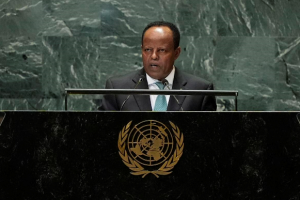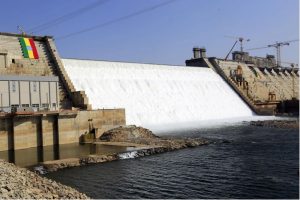The Ethiopian army is the first and foremost African army with the longest and richest experience as well as an excellent reputation in international peacekeeping missions. Ethiopia has been actively involved in global peacekeeping efforts for several decades now, with a long-standing history of deploying troops to various conflict zones around the world. The country’s contributions to United Nations (UN) and African Union (AU) peacekeeping missions as well as multinational peace-making operations have earned it a reputation as a key player in promoting regional and global security.
Ethiopia’s involvement in peacekeeping missions dates back to the 1950s when it first sent troops to Korea as a part of the UN Command in the Korean War. There are still several Korean War veterans who are still around to give an eyewitness account of the heroic deeds of the Ethiopian soldiers 70 years ago in Korea. It is amazing to see The Korean veterans in their 90s at the forefront of the magnificent military parade held in the capital last week as a part of the celebration of 116th Ethiopian Armed Forces Day.
Kagnew, the Ethiopian battalion that went to Korea, was mainly drawn from the Imperial Bodyguard – Ethiopia’s elite troops. [The battalion sourced its name from the war-horse of Ras Mekonnen, Emperor Haile Selassie’s father, and hero of the battle of Adwa.] Kagnew battalion went to Korea mission holding not only the Ethiopian flag but also a motto: “Never be captured on the war field.”
Even though they were severely tested by the harsh conditions of the war, the Kagnew troops remained true to their motto. At the end of their Korean mission, around 120 paid the ultimate price while over 500 Kagnew soldiers were wounded, for the freedom of South Korean people. However, none of the Ethiopian soldiers were captured and taken prisoner by their enemy. Some of the Kagnew soldiers were decorated even by the US government for their gallantry in the Korean War.
As they say, one can not get a second chance to make the first impression. The outstanding performance of the Ethiopian army in its debut international peace-making mission in Korea has made it possible for the army to gain an indelible global reputation for sheer professionalism and discipline. The success of the Kagnew mission has opened doors for successive invitations of the Ethiopian army by international agencies like the UN and AU to participate in peacekeeping and peace-making missions around the world.
Following the Korean mission of the Kagnew battalion, The Ethiopian soldiers were invited by the UN to participate in another international mission. This time it was here in Africa, Congo. What is interesting here is the Commander-in- Chief of United Nations Force in Congo in 1962 was a general from the Ethiopian army, Lt. General Kebede Gebre. Thus unlike in Korea, the Ethiopian army was represented not only as a participant in the peace-making mission in Congo but also as the leader of the mission.
Since then, Ethiopia has continued to contribute troops as well as commanders to various peacekeeping missions around the world. Ethiopia contributed troops to peacekeeping missions to such conflict-stricken nations including Somalia, Sudan, South Sudan, and Liberia. Ethiopian Army’s involvement in peacekeeping missions has become more significant, with a particular focus on African conflicts.
As of July 2023, Ethiopia was ranked as one of the top 12 countries contributing a large number of troops to UN peacekeeping missions across the world missions around the world. Two years earlier, the figure was impressive. At that time, in 2021, Ethiopia was the largest troop-contributing country to UN peacekeeping missions from Africa, with over 6,500 troops deployed in various missions around the world. The country has also provided police officers and military experts for UN peacekeeping operations.
Ethiopia’s Army history of involvement in peacekeeping missions demonstrates its commitment to promoting global security and stability. The country’s contributions have been significant and have earned it a reputation as a reliable partner for peacekeeping efforts.
In the context of African peacekeeping efforts, Ethiopia has played a critical role in promoting regional security and stability. The country has been actively involved in the African Union’s peace and security architecture, contributing troops and resources to various AU-led missions.
For instance, Ethiopia’s role in bringing stability to the Horn region has been critical, particularly in Somalia, which has been plagued by conflict and instability for several decades. Ethiopia was one of the first countries to contribute troops to the AU Mission in Somalia (AMISOM) in 2007, which has been instrumental in stabilizing the country and countering extremist groups such as Al-Shabaab. In addition, The Ethiopian army provides military capacity-building support to the Somali National Army.
Ethiopia’s involvement in Somalia dates back to the early 2000s when it provided military assistance to the Transitional Federal Government (TFG). In 2006, Ethiopian troops entered Somalia to oust the religious fundamentalist group Islamic Courts Union (ICU), which had taken control of much of southern Somalia.
In addition to its efforts in Somalia, Ethiopia has also played a significant role in promoting regional security and stability. The country has been involved in efforts to resolve conflicts in South Sudan and Sudan. Ethiopia has contributed troops to the AU mission in Sudan (AMIS), which later evolved into the UN-AU Hybrid Operation in Darfur (UNAMID).
Ethiopia’s peacekeeping efforts have had a significant impact on regional and global security. By contributing troops to UN and AU peacekeeping missions, Ethiopia’s army has played a critical role in promoting peace and stability in conflict-affected regions. The country’s involvement in peacekeeping operations has helped to reduce the risk of violence and conflict, creating conditions for sustainable development and economic growth.
In the context of the Horn region, Ethiopia’s peacekeeping efforts have been particularly significant. The country’s contributions to AMISOM have been instrumental in stabilizing Somalia and countering extremist groups such as Al-Shabaab. Ethiopia’s involvement in efforts to resolve conflicts in South Sudan and Sudan has also helped to promote regional security and stability.
On a global scale, Ethiopia’s contributions to UN peacekeeping missions have been critical for promoting international security. As a major troop-contributing country to UN peacekeeping missions from Africa, Ethiopia has demonstrated its commitment to multilateralism and global peace. By providing troops, police officers, and military experts to various peacekeeping operations around the world, Ethiopia has helped to build global capacity for responding to conflict and crisis.
The country’s contributions have helped to promote peace and stability in conflict-affected regions, reducing the risk of violence and creating conditions for sustainable development. Ethiopia’s continued involvement in peacekeeping efforts will be essential for promoting global security and stability in the years ahead.
The future of Ethiopia’s involvement in global peacekeeping is expected to remain significant. The country’s commitment to promoting regional and global security through multilateralism will continue to make it a valuable partner for international peacekeeping initiatives.
The well-established reputation, training, and discipline of the Ethiopian army are essential components of its success in peacekeeping missions, and its continued involvement in peacekeeping efforts will be crucial for promoting global security and stability.
As the world faces ongoing challenges related to conflict, terrorism, and extremism, Ethiopia’s Army contributions to UN and AU peacekeeping missions will remain vital for building capacity for responding to crises and promoting sustainable development.
BY SOLOMON WASSIHUN
The Ethiopian Herald November 5/2023





